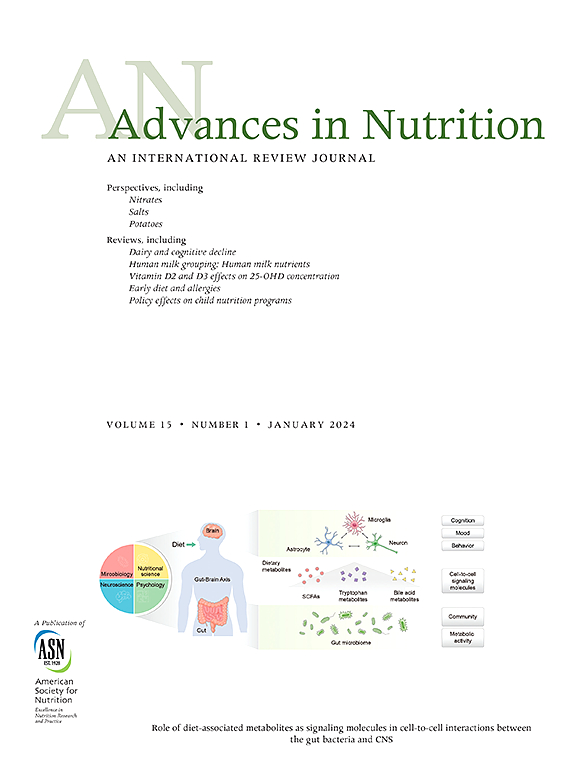Multiomics and Artificial Intelligence for Personalized Nutritional Management of Diabetes in Patients Undergoing Peritoneal Dialysis
IF 9.2
1区 医学
Q1 NUTRITION & DIETETICS
引用次数: 0
Abstract
Managing diabetes in patients on peritoneal dialysis (PD) is challenging due to the combined effects of dietary glucose, glucose from dialysate, and other medical complications. Advances in technology that enable continuous biological data collection are transforming traditional management approaches. This review explores how multiomics technologies and artificial intelligence (AI) are enhancing glucose management in this patient population. Continuous glucose monitoring (CGM) offers significant advantages over traditional markers, such as hemoglobin A1c (HbA1c). Unlike HbA1c, which reflects an mean glucose level, CGM provides real-time, dynamic glucose data that allow clinicians to make timely adjustments, leading to better glycemic control and outcomes. Multiomics approaches are valuable for understanding genetic factors that influence susceptibility to diabetic complications, particularly those related to advanced glycation end products (AGEs). Identifying genetic polymorphisms that modify a patient's response to AGEs allows for personalized treatments, potentially reducing the severity of diabetes-related pathologies. Metabolomic analyses of PD effluent are also promising, as they help identify early biomarkers of metabolic dysregulation. Early detection can lead to timely interventions and more tailored treatment strategies, improving long-term patient care. AI integration is revolutionizing diabetes management for PD patients by processing vast datasets from CGM, genetic, metabolic, and microbiome profiles. AI can identify patterns and predict outcomes that may be difficult for humans to detect, enabling highly personalized recommendations for diet, medication, and dialysis management. Furthermore, AI can assist clinicians by automating data interpretation, improving treatment plans, and enhancing patient education. Despite the promise of these technologies, there are limitations. CGM, multiomics, and AI require significant investment in infrastructure, training, and validation studies. Additionally, integrating these approaches into clinical practice presents logistical and financial challenges. Nevertheless, personalized, data-driven strategies offer great potential for improving outcomes in diabetes management for PD patients.
前景:多组学和人工智能用于腹膜透析患者糖尿病个性化营养管理。
由于饮食葡萄糖、透析液葡萄糖和其他医学并发症的综合影响,腹膜透析(PD)患者的糖尿病管理具有挑战性。能够持续收集生物数据的技术进步正在改变传统的管理方法。这篇综述探讨了多组学技术和人工智能(AI)如何加强这类患者的血糖管理。与血红蛋白糖化血红蛋白(HbA1c)等传统指标相比,连续血糖监测(CGM)具有显著优势。与反映平均血糖水平的HbA1c不同,CGM提供实时、动态的血糖数据,使临床医生能够及时调整,从而实现更好的血糖控制和预后。多组学方法对于了解影响糖尿病并发症易感性的遗传因素,特别是与晚期糖基化终产物(AGEs)相关的遗传因素是有价值的。识别基因多态性可以改变患者对AGEs的反应,从而实现个性化治疗,潜在地降低糖尿病相关病理的严重程度。腹膜透析流出物的代谢组学分析也很有前景,因为它们有助于识别代谢失调的早期生物标志物。早期发现可导致及时干预和更有针对性的治疗策略,从而改善患者的长期护理。人工智能集成通过处理来自CGM、遗传、代谢和微生物组谱的大量数据集,正在彻底改变PD患者的糖尿病管理。人工智能可以识别模式并预测人类可能难以检测到的结果,从而为饮食、药物和透析管理提供高度个性化的建议。此外,人工智能可以通过自动化数据解释、改进治疗计划和加强患者教育来帮助临床医生。尽管这些技术前景光明,但也存在局限性。CGM、多组学和人工智能需要在基础设施、培训和验证研究方面进行大量投资。此外,将这些方法整合到临床实践中会带来后勤和财务方面的挑战。然而,个性化的、数据驱动的策略为改善PD患者的糖尿病管理结果提供了巨大的潜力。
本文章由计算机程序翻译,如有差异,请以英文原文为准。
求助全文
约1分钟内获得全文
求助全文
来源期刊

Advances in Nutrition
医学-营养学
CiteScore
17.40
自引率
2.20%
发文量
117
审稿时长
56 days
期刊介绍:
Advances in Nutrition (AN/Adv Nutr) publishes focused reviews on pivotal findings and recent research across all domains relevant to nutritional scientists and biomedical researchers. This encompasses nutrition-related research spanning biochemical, molecular, and genetic studies using experimental animal models, domestic animals, and human subjects. The journal also emphasizes clinical nutrition, epidemiology and public health, and nutrition education. Review articles concentrate on recent progress rather than broad historical developments.
In addition to review articles, AN includes Perspectives, Letters to the Editor, and supplements. Supplement proposals require pre-approval by the editor before submission. The journal features reports and position papers from the American Society for Nutrition, summaries of major government and foundation reports, and Nutrient Information briefs providing crucial details about dietary requirements, food sources, deficiencies, and other essential nutrient information. All submissions with scientific content undergo peer review by the Editors or their designees prior to acceptance for publication.
 求助内容:
求助内容: 应助结果提醒方式:
应助结果提醒方式:


